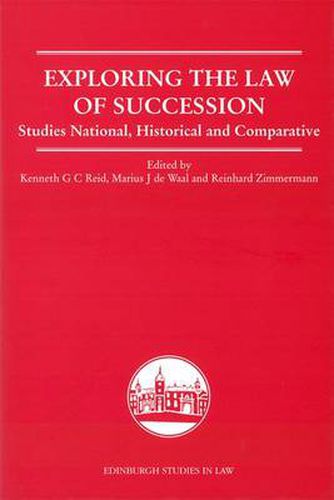Readings Newsletter
Become a Readings Member to make your shopping experience even easier.
Sign in or sign up for free!
You’re not far away from qualifying for FREE standard shipping within Australia
You’ve qualified for FREE standard shipping within Australia
The cart is loading…






By comparison with other areas of private law, the law of succession has been neglected by modern scholars. This volume contributes to its rehabilitation by examining key issues in succession law from a variety of perspectives: national, historical and comparative. In particular it seeks to extend the techniques of legal comparison into an area of law where hitherto they have been little used. The jurisdictions most prominently featured are the mixed jurisdictions of Scotland and South Africa, but there are frequent comparative references, and special attention is given to the Netherlands as the country which has most recently re-written its succession law. The authors of the individual chapters are drawn from Scotland, South Africa, Germany, Italy and the Netherlands. Among the topics covered are freedom of testation, testamentary conditions and public policy, forfeiture clauses and events, revocation of wills by changed circumstances, revocation of mutual wills, fideicommissary substitutions, and succession agreements. The volume opens with an overview of the state of comparative law and with a consideration of compulsory heirship in Roman law.
$9.00 standard shipping within Australia
FREE standard shipping within Australia for orders over $100.00
Express & International shipping calculated at checkout
By comparison with other areas of private law, the law of succession has been neglected by modern scholars. This volume contributes to its rehabilitation by examining key issues in succession law from a variety of perspectives: national, historical and comparative. In particular it seeks to extend the techniques of legal comparison into an area of law where hitherto they have been little used. The jurisdictions most prominently featured are the mixed jurisdictions of Scotland and South Africa, but there are frequent comparative references, and special attention is given to the Netherlands as the country which has most recently re-written its succession law. The authors of the individual chapters are drawn from Scotland, South Africa, Germany, Italy and the Netherlands. Among the topics covered are freedom of testation, testamentary conditions and public policy, forfeiture clauses and events, revocation of wills by changed circumstances, revocation of mutual wills, fideicommissary substitutions, and succession agreements. The volume opens with an overview of the state of comparative law and with a consideration of compulsory heirship in Roman law.